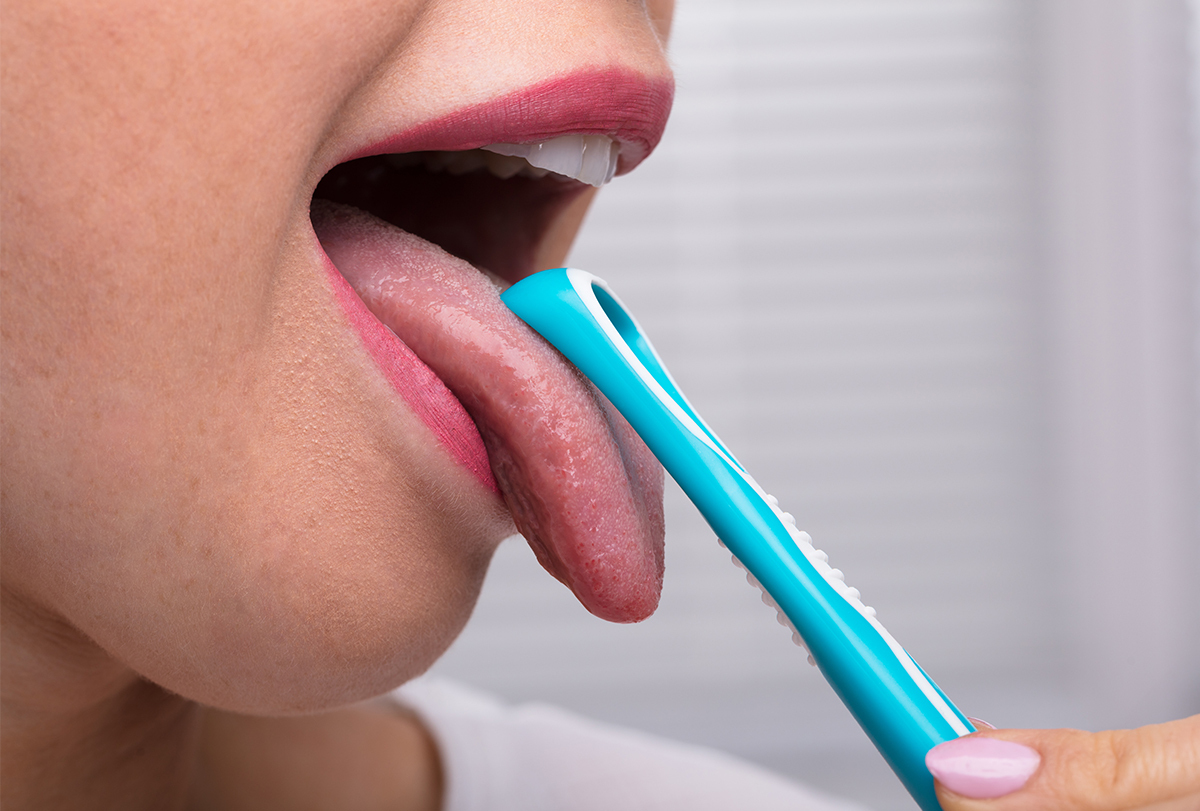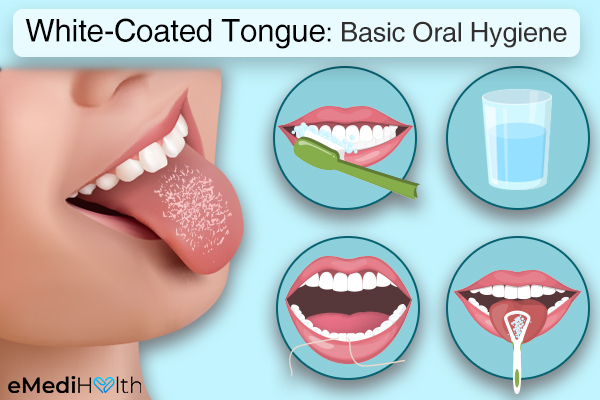In this article:
The upper surface of the tongue is covered with fingerlike projections called papillae, which contain taste buds and temperature sensors and enable eating. These tiny bumps are the same fleshy color as the tongue, making them barely noticeable.

But if there’s a buildup of food debris, bacteria, and dead cells on the tongue surface, these nodules swell up and turn slightly pale. It ultimately makes your tongue appear white as well.
Home Remedies
Here are some home remedies to help you get rid of white tongue.
1. Gargle with salt water
You can make your own chemical-free mouthwash at home by simply mixing salt in water.
When you rinse your mouth with a saline solution, the coarse granules of sea salt or kosher salt provide a gentle scrubbing action against the tongue.
Swishing this solution in your mouth helps dislodge the plaque, food particles, and dead cells that have accumulated on your tongue, which are eventually spat out.
Using a saline gargle to flush out the impurities from your oral cavity may also help improve your overall oral well-being in general, making you less prone to problems such as a white tongue.
According to a 2015 clinical trial, salt water may work as an antiseptic solution that can help eliminate the oral bacteria responsible for foul breath when used as a mouth rinse. (1)
Another study suggested that a salt water rinse can be used as an additional curative measure along with the traditional mechanical plaque control techniques to curb oral diseases. (2)
Directions:
- Mix a few teaspoons of salt in a glass of warm water.
- Gargle with this salt water thoroughly and then spit it out.
- Repeat several times a day until you are satisfied with the results.
Note: Salt water rinses are not indicated for people with hypertension unless they first consult with their general physician.
Salt water can serve as a safe, nontoxic, and naturally antiseptic mouthwash that can help preserve and improve your oral health. ENT specialists routinely recommend it as a self-care measure to relieve the discomforts associated with a white-coated tongue.
2. Consume probiotics

Probiotics are generally considered important agents for the improvement of gut health as they aid digestion, but they are also a good remedy for the white tongue.
According to one literature review, probiotics may help improve oral health by inhibiting the growth or colonization of disease-causing pathogens in the mouth. (3) This beneficial effect can be attributed to the presence of L. acidophilus and B. lactis cultures in fermented products such as probiotics. However, such an effect needs to be verified by further scientific investigation. (4)
A number of dietary sources can supplement your probiotic needs, which largely include fermented foods such as yogurt, kefir, sauerkraut, kimchi, miso, and tempeh.
You can also speak with your doctor about starting on a probiotic supplement if you fail to meet your requirement of good bacteria through food.
Substantial research supports the use of probiotics as a means to better oral health, but the extent and efficacy of their antibacterial function need to be examined further through additional randomized clinical trials with long-term follow-up periods.
3. Use a tongue scraper
Maintaining proper oral hygiene is vital to a healthy tongue. In addition to brushing and flossing your teeth, one complementary step that you should include in your oral hygiene regimen is tongue scraping. (5) This method is especially effective in reducing and removing any debris and bacteria that settle in the oral cavity.
A study found that tongue cleaning reduced the amount of bacterial accumulation in the tongue coating. (6)
Scrape your tongue gently but thoroughly, from back to front, using a tongue cleaner or a soft toothbrush. Do not overdo it by applying too much pressure, which can lead to open wounds, making you susceptible to infection. Also, do not insert the scraper so far back that it causes a gag reflex.
While there are specific tools manufactured for this function, some toothbrushes have an inbuilt tongue scraper at the back of their brush head.
Complete oral hygiene should include regular scraping of your tongue along with the standard brushing, flossing, and rinsing routine. Your tongue accumulates food debris, dead cells, bacterial plaque, and other impurities over time unless cleaned properly. This oral care measure carries a lot of scientific support and is a highly recommended practice to address conditions such as a white tongue.
Self-Care Tips
Follow these self-care measures to prevent and treat white tongue:

1. Gargle with warm water
Regularly gargle with warm water, especially after meals, to flush out the remnant food particles on your tongue.
2. Include more crunchy fruits and vegetables in your diet
Chewing these hard foods gives your oral cavity a bit of additional cleaning to eliminate plaque buildup. Apples, strawberries, guavas, celery, and carrots are all good options to naturally clean a white-coated tongue.
3. Eliminate alcohol abuse, tobacco consumption, and smoking
Eliminate alcohol abuse, tobacco consumption, and cigarette smoking as these unhealthy habits are some of the prime culprits for the development of white plaque on the tongue.
4. Visit your dentist regularly
Visit your dentist every 6 months for a checkup to ensure optimal oral health and so that corrective measures can be undertaken if needed.
Professional dental cleaning will help you stave off a whole range of oral health issues.
5. Commit to your oral hygiene routine
Completely commit to your oral hygiene routine, which stipulates that you brush your teeth at least twice a day with a fluoride-containing toothpaste.
Use a soft-bristled, angled brush, which enables you to clean the inner surfaces of your teeth.
6. Floss regularly
Flossing can help you dislodge the food particles stuck in the hard-to-reach corners of your mouth and the crevices between your teeth. Thus, flossing your teeth once a day can help deep clean your oral cavity.
7. Rinse your mouth with a fluoride-containing mouthwash
Another important but often neglected step that completes your oral hygiene regimen is rinsing your mouth with a fluoride-containing mouthwash every day.
8. Avoid dairy products and sugary foods
Avoid dairy products and sugary foods that trigger mucus production and coat the tongue.
9. Avoid using harsh oral hygiene products
Avoid certain oral hygiene products that can be too harsh for your already irritated tongue. These include alcohol-containing mouthwash and toothpaste that contain sodium lauryl sulfate.
Similarly, rinsing your mouth with undiluted hydrogen peroxide can further aggravate your condition and is strictly ill-advised.
10. Limit your intake of spicy foods
Limit your intake of spicy foods to avoid any further irritation to your oral cavity.
11. Stay hydrated
Keep yourself sufficiently hydrated by drinking at least 8 glasses of water in a day. It is best to meet your daily fill of fluids by drinking water throughout the day. This keeps your mouth moist at all times and thereby helps prevent bad breath and other oral issues.
Water helps flush away the food debris from your mouth, which is otherwise used by the oral bacteria as fodder to grow.
Most-Asked Questions About White Tongue

Is rinsing your mouth with hydrogen peroxide solution good for treating a white tongue?
Using a mouthwash containing 3% hydrogen peroxide can help deeply clean the oral cavity, including the tongue surface.
Bear in mind, however, that hydrogen peroxide is a rather strong chemical that can end up eroding your oral mucosa if used excessively or in stronger concentrations.
Commercial mouthwashes typically contain 1.5%–3% hydrogen peroxide, which is the safe range. Anything above 3% can leave you with mouth burns and even tissue death.
You can make your own mouthwash by mixing equal parts water and 3% hydrogen peroxide. Use this solution to rinse your mouth for no more than 1 minute at a time, four times a day.
Can oil pulling help reduce white coating on the tongue?
Yes. However, regular hygiene is more important.
Final Word
White tongue may look disturbing, but it is usually temporary and not a cause for concern. This condition is often caused by negligent oral hygiene and can easily be resolved through gentle tongue cleaning and drinking plenty of water.
If these measures don’t work, the above-mentioned tips and remedies can help as well. However, it is always recommended to get a white tongue evaluated by a doctor to identify any other serious underlying condition that may require more concerted medical treatment.

- Was this article helpful?
- YES, THANKS!NOT REALLY



